
Political Censorship and “Fake News” on Social Media.Politics and Social Media Access: Sudan’s 2019 Protests.Political Marketing and Privacy: The Case of Cambridge Analytica.Internet Freedoms in the Global Context.“Big Brother Bubble” – Reinforcement Theories.

The Thin Line Between “Activism” and “Slacktivism”.Local Politics as a Global Social Media Discussion: #BringBackOurGirls.Political Messages and Viral Trends on Social Media: Kony 2012.Political Campaigns on Social Media: “El Bronco”.Political Action and Social Media: The Arab Spring.Social Media and Civic Engagement: Three Theories of Impact.Social Media Campaigns: Social Movement or Hyper Political Marketing?.Social Media Meets Politics: A Brief History.This post, then, will give an overview of how these platforms impact politics by exploring political science research, cyber policy, grassroots advocacy campaigns, opinion polls, and public surveys. The sections below will also focus on key real-world examples to help illustrate these concepts in action.īelow the post is divided into the following sections:

It’s important that each of the above perspectives is included in our understanding of the role of social media in politics. The new media is a double-edged sword for politics, giving space to some while making others targets. Social media has improved information flows, outreach, mobilization, and fundraising however, it has also increased surveillance, political polarization, the spread of misinformation, and harassment.Įach aspect of social media’s influence on politics is the subject of ongoing research and debate in political science.Īt the same time, policymakers are increasingly scrutinizing social media platforms, particularly in the domains of data privacy, innovation, and the spread of misinformation. Social media has big implications for advocates of social causes too as the platforms provide an innovative way to spread messages.Īn often overlooked aspect of social media’s impact on politics, however, is that communities across the world have formed different relationships with these platforms.

Research shows that social media can have a minor but still significant influence on voter behavior. While the impact of social media on politics seems to be changing all the time, some consistent trends are emerging.


 0 kommentar(er)
0 kommentar(er)
